
The government of Myanmar has two ministries controlling transportation, the Ministry of Transport and the Ministry of Rail Transport.

Yangon, formerly romanized as Rangoon, is the capital of the Yangon Region and the largest city of Myanmar. Yangon served as the capital of Myanmar until 2006, when the military government relocated the administrative functions to the purpose-built capital city of Naypyidaw in north central Myanmar. With over five million people, Yangon is Myanmar's most populous city and its most important commercial centre.

Exo, officially known as Réseau de transport métropolitain, is a public transport system in Greater Montreal, including the Island of Montreal, Laval, and communities along both the North Shore of the Mille-Îles River and the South Shore of the St. Lawrence River. It was created on June 1, 2017, taking over from the Agence métropolitaine de transport. The RTM operates Montreal's commuter rail and metropolitan bus services, and is the second busiest such system in Canada after Toronto's GO Transit. In May 2018, the former Réseau de transport métropolitain (RTM) was branded as Exo.
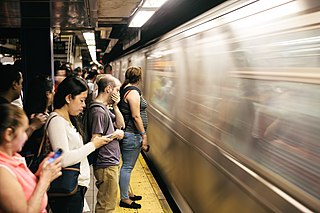
A rush hour or peak hour is a part of the day during which traffic congestion on roads and crowding on public transport is at its highest. Normally, this happens twice every weekday: once in the morning and once in the afternoon or evening, the times during which most people commute. The term is often used for a period of peak congestion that may last for more than one hour.

The Société de transport de Montréal is a public transport agency that operates transit bus and rapid transit services in the urban agglomeration of Montreal, Quebec, Canada. Established in 1861 as the "Montreal City Passenger Railway Company", it has grown to comprise four subway lines with a total of 68 stations, as well as 212 bus routes and 23 night routes. The STM was created in 2002 to replace the Société de transport de la communauté urbaine de Montréal. The STM operates the most heavily used urban mass transit system in Canada, and one of the most heavily used rapid transit systems in North America. As of 2019, the average daily ridership is 2,297,600 passengers: 977,400 by bus, 1,306,500 by rapid transit and 13,700 by paratransit service.
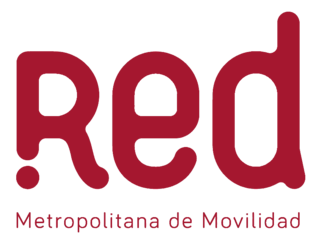
Red Metropolitana de Movilidad is a public transport system that serves Santiago, the capital of Chile. It is considered the most ambitious transport reform undertaken by a developing country according to the World Resources Institute.

Yangon International Airport is the primary and busiest international airport of Myanmar. The airport is located in Mingaladon, 15 kilometres (9.3 mi) north of central Yangon. All ten Myanmar carriers and about 30 international airlines operate at Yangon International Airport. The airport is also colloquially known as Mingaladon Airport due to its location.

Rail operators are government-assisted profit-based corporations, fares and ticketing on Singapore's Mass Rapid Transit (MRT) system are aimed to break-even or exceed operating expenses. Rail operators collect fares based on account-based (ABT) and card-based ticketing options, the prices of which are calculated based on the distances travelled between the origin and destination. These prices increase in stages for standard non-concessionary travel, according to the distances travelled. In account-based ticketing, the fare is automatically calculated in the back-end and charged to the passenger post journey. On the other hand, card-based ticketing is proprietary to the transport network and the fare is computed by the system based on the store values recorded in the cards. The public transit system is harmonising towards full ABT.

The Snapper card is a contactless electronic ticketing card used to pay for bus and train fares in Wellington, New Zealand. It was introduced in Wellington in July 2008. Another version – the Snapper HOP card – was introduced to Auckland in 2011 and withdrawn from Auckland in late 2013. Snapper CityLink cards were introduced in Whangārei in March 2014 and withdrawn in September 2018. It was owned by Snapper Services Limited, a former subsidiary of Infratil until 2019 when it was sold to ICM Limited, a subsidiary of Allectus Capital.
The go card is an electronic smartcard ticketing system developed by Cubic Corporation, which is currently used on the Translink public transport network in South East Queensland, Australia. To use the go card, users hold the card less than 10 cm away from the reader to "touch on" before starting a journey, and must do the same to "touch off" the service at the end of the journey. The cost of each journey is deducted from the go card balance.
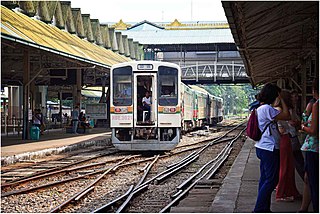
Yangon Circular Railway is the local commuter rail network that serves the Yangon metropolitan area. Operated by Myanma Railways, the 45.9-kilometre (28.5 mi) 39-station loop system connects satellite towns and suburban areas to the city. Circa 2008–2010, the railway had about 200 coaches, had 20 daily runs, and sold 100,000 to 150,000 tickets daily. The railway is heavily utilized by lower-income commuters, as it is the cheapest method of transportation in Yangon.

The Helsinki Regional Transport Authority is the inter-municipal authority that maintains the public transportation network of the nine municipalities of Greater Helsinki, Finland.

The transportation system in Metro Manila covers the road network, rail network, ferries, ports and airports located with the metropolitan Manila area. Road transportation in Metro Manila is diverse, composed of many types of private and public transport vehicles. These include Taxis, buses, jeepneys, tricycles and pedicabs. In some areas, especially in Divisoria and large public markets, two-stroke motors are fitted in the pedicabs and are used for goods transport. Regardless of modernity, horse-drawn kalesas are still used in the streets of Binondo and Intramuros. Ridesharing services such as Grab also operate within in Metro Manila.

MetroCARD is a contactless smartcard ticketing system for public transport services in the Adelaide city and suburbs in South Australia. The system is managed by Adelaide Metro and is usable on their bus, train and tram services.

More Card is a rechargeable smart card for paying transportation fares in public transport systems in India. Tipped as a nationwide interoperable transport card, the card aims to be a single point of transaction, applicable in state buses, Metro and even parking. The card was launched in 2012 in Delhi, initially acting as a common card for the Delhi Metro and its feeder buses.

Beep is a reloadable contactless smart card created in 2015 to be a replacement for the magnetic card-based system in paying rail-based rapid transit transportation fares in and around Metro Manila. Beep is also used in lieu of cash in some convenience stores and other businesses. The Beep system is implemented and operated by AF Payments Incorporated, which is primarily owned by Ayala Corporation and Metro Pacific Investments Corporation.
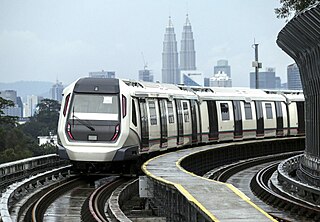
The Klang Valley Integrated Transit System is an integrated transport network that primarily serves the area of Klang Valley and Greater Kuala Lumpur. The system commenced operations in August 1995 with the introduction of commuter rail service on the existing rail between Kuala Lumpur and Rawang. The system have since expanded and currently consists of 11 fully operating rail lines in a radial formation; two commuter rail lines, six rapid transit lines, one bus rapid transit line and two airport rail links to the Kuala Lumpur International Airport's (KLIA) Terminal 1 and Terminal 2, and one temperarily suspended airport rail link to the Sultan Abdul Aziz Shah Airport. The system encompasses 528.4 kilometres (328.3 mi) of grade-separated route on standard gauge and metre gauge with 197 operational stations.
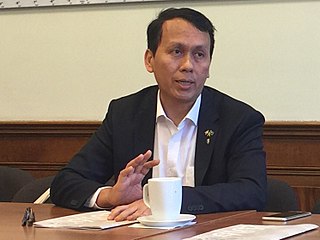
Phyo Min Thein is a Burmese politician and former political prisoner who served as Chief Minister of Yangon Region and Yangon Region Parliament from 2016 to 2021. He also served as an MP for Hlegu Township Constituency No. 2. Previously, he was the chairman of Union Democratic Party and founder of the People Democracy Party which later merged with Union Democratic Party.
OMNY is a contactless fare payment system, currently being implemented for use on public transit in the New York metropolitan area. OMNY can currently be used to pay fares at all New York City Subway and Staten Island Railway stations, on all MTA buses, AirTrain JFK, Metro North's Hudson Rail Link, and on the Roosevelt Island Tram; when completely rolled out, it will also replace the MetroCard on Bee-Line buses, and NICE buses. OMNY will also expand beyond the current scope of the MetroCard to include the Long Island Rail Road and Metro-North Railroad.

Omni Focus is the Bus Service Company, that runs under the authority of YRTA since 1 January 2017. Omni Focus is currently running 7 bus lines, YBS - 20, YBS - 56, YBS - 82, YBS - 83, YBS - 98, YBS - 99 and Airport Shuttle. Airport Shuttle is Running from Yangon International Airport to Sule Pagoda with the Shuttling system. All the Bus Lines from Omni Focus are currently running with the 24 hours service in Yangon.


















